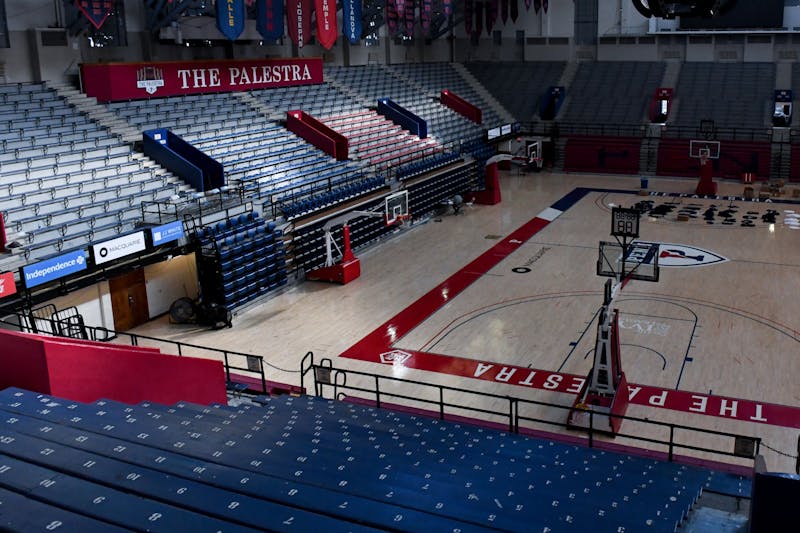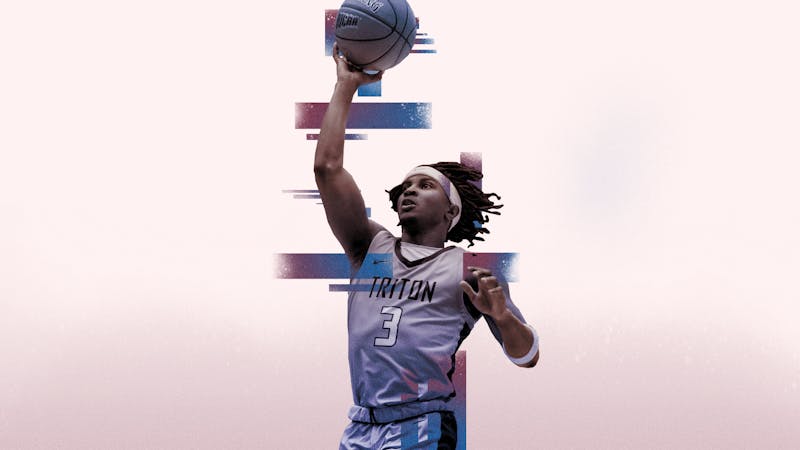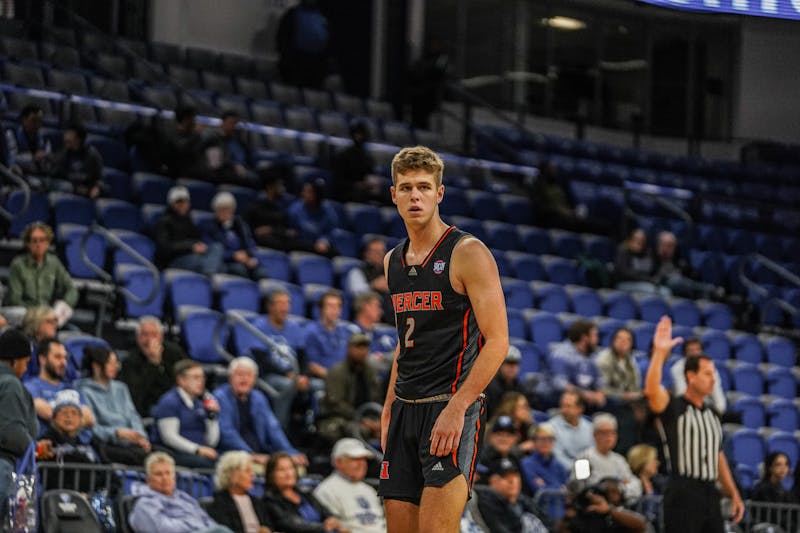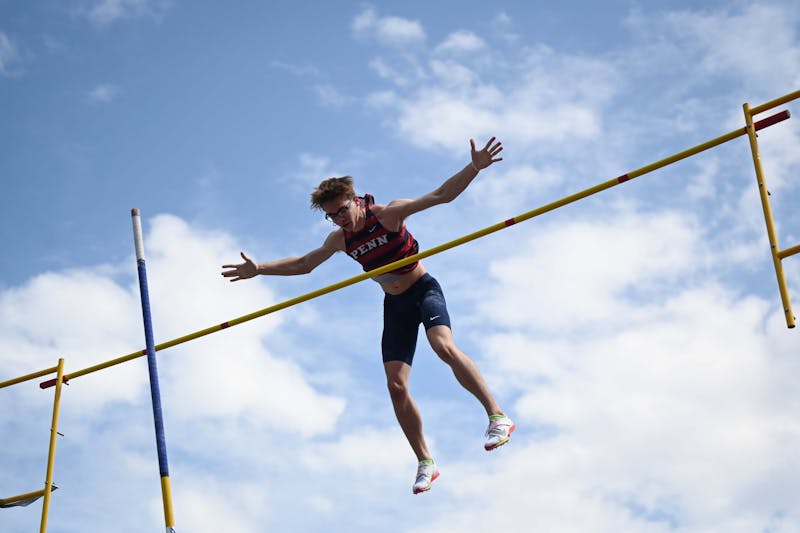
For Penn volleyball sophomore outside hitter Zada Sanger, Quakers' blood has always been in her.
In a full circle moment, the impact player now plays under the same Palestra lights that once shone on her mother and father, who are Penn volleyball and basketball alumni, respectively.
In the 2023-24 season, Sanger — then a freshman — led the team in kills, totaling 265, good for second in the Ivy League. Sanger also set a team high in start appearances.
However, despite her current stardom, volleyball was not always the dream. Born in Los Angeles, Sanger aspired to be “the next Gabby Douglas,” crafting her gymnastic talent as a young girl. Her mother, always hoping to change her mind and have Sanger follow in her footsteps, decided to place her in recreational volleyball when the family made the move to Northern California. And so, her volleyball development started at age 10 — though it could hardly be described as love at first sight.
“I didn’t want to play volleyball,” Sanger said. “It wasn’t fun — there were no flips.”
When it came to middle school and time to try out for a club team, Sanger tried to “throw” her tryouts and “intentionally not make the team.” Thus marked a two-year stint on a team that she described as “haphazard” under the direction of a peer’s parents. Having been a gymnast and having athletic genes, Sanger was able to develop skills that set her apart on the court, despite her distaste for the game. The turning point for her took place in her last club tournament in eighth grade.
“Something clicked and I found my swing [and that] I can hit hard,” Sanger said.
This moment marked a turning page in Sanger’s volleyball journey. She realized her potential in the sport and wanted to go all in. A visit to one of the best local volleyball clubs during her freshman year of high school in Northern California cemented this idea. The director pulled her aside and showed a wall with commits, highlighting a standout athlete slated to play at Pepperdine.
“‘In two years, if you come to play for us, you could be like them,’” Sanger recalled the director saying.
Sanger jumped at the opportunity, but it came with a steep learning curve. The talent level that she saw was uncharted, and there was serious ground to make up as a “late starter” in the sport. Playing alongside girls who grew up with it was originally difficult for someone who just started playing competitively as a ninth grader.
“My only regret is that I didn’t do it earlier,” Sanger said.
When asked if Penn was her dream school, Sanger quickly denied, stating that it was originally her dream to stay on the West Coast. Her parents emphasized that volleyball should always be a tool to get into the best school possible. In a way to differentiate herself from her Quaker parents and not be seen as a “copy,” Sanger heavily considered other Ivy offers. To a West Coast native, there was no appeal to urban Philadelphia — “there’s no beach!”
Fortunately, her visit to campus changed her mind. As her first official athletic visit to any institution, Sanger recalls immediately loving the girls on the team.
“I really liked the energy of the staff, and the team was so welcoming,” Sanger said.
Her visit left such a significant impression that it was a no-brainer after touring other schools. Ultimately, being able to receive an education from the Wharton School was an opportunity she could not pass up on.
Sanger has made an effort to create her own path and shared that despite playing the same sport, there are stark differences between herself — an outside hitter — and her mother — a middle. The two share a close relationship in their shared experiences.
“She does understand the pressures … practicing five hours a day,” Sanger said. “I’m able to talk volleyball in a technical sense and she can get it.”
So what does she chalk her instant impact as a freshman up to? For her, it's a constant need to get better. Sanger mentioned that many people would describe her as extreme, acknowledging being an intense player, derived from the love for pressure and the game.
That passion has allowed her to become the primary scorer for Penn volleyball.
“I like setting goals, meeting them, and pushing myself and pursuing excellence in different areas,” Sanger said.
Her statistics for this year are just the beginning. Her goals for this year are primarily team oriented. At the top is working toward making an appearance in the Ivy tournament. On a personal level, she hopes to become first team All-Ivy and eventually break the conference record for most kills in a game.
The team will need Sanger at her best in order to have any hopes at reversing the group’s last season woes, where the Quakers finished with a record of 4-20, and 2-12 in the Ivy.
As a better-footed sophomore, Sanger looks to this season with hope, citing the team’s promising rookie talent and returning players with more court experience.
Sanger also mentioned the sports IQ jump from club to college, explaining that as a younger athlete, it was “easier” to win by either attacking one person or “the weak link.” She was able to rely on her strength to hit the ball to win sets. However, college forced her to adopt different strategies.
“You have to earn every point and won't get away with a bad blocker or lazy defender,” Sanger said.
Collectively, the team has struggled in the past couple years to succeed on the court, marred by a toxic training environment created by former staff, which ultimately shook the culture and forced the team to find an “identity coming out of COVID-19 and season cancellation,” said Sanger.
Under the leadership of coach Meredith Schamun, who joined the staff in 2020, the team culture has dramatically changed. Sanger recalled the help of two volleyball seniors in her freshman year, who took her “under their wing” and helped her understand the social and academic ways of Penn. Now, as a sophomore, Sanger hopes to repay that same level of trust to the new rookie recruits, especially understanding the difficulty of moving so far away from home.
“Their enthusiasm and effort does not go unnoticed,” Sanger said.
For Sanger, the best piece of advice that she has been given came from her club coach who realized one thing: “‘You play your best when you play relaxed and confident.’”
Sanger now starts each game with a pre-game ritual: positive self-talk, hype music, pinning up her hair in the superstitious “lucky slick-back hairdo” and completing a plyometric workout.
Sanger puts intentional thought into every aspect of her game, even down to her own uniform. When asked, Sanger explained that the jersey number eight has been consistent throughout her career — she even wears a golden bracelet with the number inscribed on it.
“It’s a lucky number and represents calm,” Sanger said. “It’s circular, and when flipped sideways, it becomes infinity.”
As an added meaning, while her parents were at Penn, her mother wore No. 4 and her father wore No. 44. Both wore the number with pride, so it makes it all the more special for Sanger that she gets to wear the double of that number.
The Wharton student hopes to pursue a concentration in finance, combining her passion for sports and business in her post-college endeavors.
Sanger closed by mentioning the ultimate bond that is being a part of Penn volleyball.
“I have never been on a team before where I’ve had such close relationships with every single person,” Sanger said. “I could get dinner individually with any person on the team and it wouldn’t be a problem.”
With revived hope for a better season, Penn is set to take the court against New Jersey Institute of Technology on Tuesday at 6 p.m. in Newark, N.J. The Quakers are 4-3 thus far in the season.
The Daily Pennsylvanian is an independent, student-run newspaper. Please consider making a donation to support the coverage that shapes the University. Your generosity ensures a future of strong journalism at Penn.
Donate








